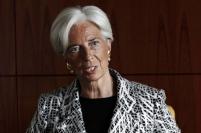- Sat, 05/26/2012 - 16:20
- 0 Comments
(Larry Elliott and Decca Aitkenhead, The Guardian). The International Monetary Fund has ratcheted up the pressure on crisis-hit Greece after its managing director, Christine Lagarde, said she has more sympathy for children deprived of decent schooling in sub-Saharan Africa than for many of those facing poverty in Athens.
In an uncompromising interview with the Guardian, Lagarde insists it is payback time for Greece and makes it clear that the IMF has no intention of softening the terms of the country's austerity package.
Using some of the bluntest language of the two-and-a-half-year debt crisis, she says Greek parents have to take responsibility if their children are being affected by spending cuts. "Parents have to pay their tax," she says.
Greece, which has seen its economy shrink by a fifth since the recession began, has been told to cut wages, pensions and public spending in return for financial help from the IMF, the European Union and the European Central Bank.
Asked whether she is able to block out of her mind the mothers unable to get access to midwives or patients unable to obtain life-saving drugs, Lagarde replies: "I think more of the little kids from a school in a little village in Niger who get teaching two hours a day, sharing one chair for three of them, and who are very keen to get an education. I have them in my mind all the time. Because I think they need even more help than the people in Athens."
Lagarde, predicting that the debt crisis has yet to run its course, adds: "Do you know what? As far as Athens is concerned, I also think about all those people who are trying to escape tax all the time. All these people in Greece who are trying to escape tax." She says she thinks "equally" about Greeks deprived of public services and Greek citizens not paying their tax.
"I think they should also help themselves collectively." Asked how, she replies: "By all paying their tax."
In her interview Lagarde says Greece is not getting softer treatment than a poor country in the developing world, and that the IMF does not find it harder to impose strong conditions on a rich nation.
"No, it's not harder. No. Because it's the mission of the fund, and it's my job to say the truth, whoever it is across the table. And I tell you something: it's sometimes harder to tell the government of low-income countries, where people live on $3,000, $4,000 or $5,000 per capita per year, to actually strengthen the budget and reduce the deficit. Because I know what it means in terms of welfare programmes and support for the poor. It has much bigger ramifications."
- 331 reads







Post new comment